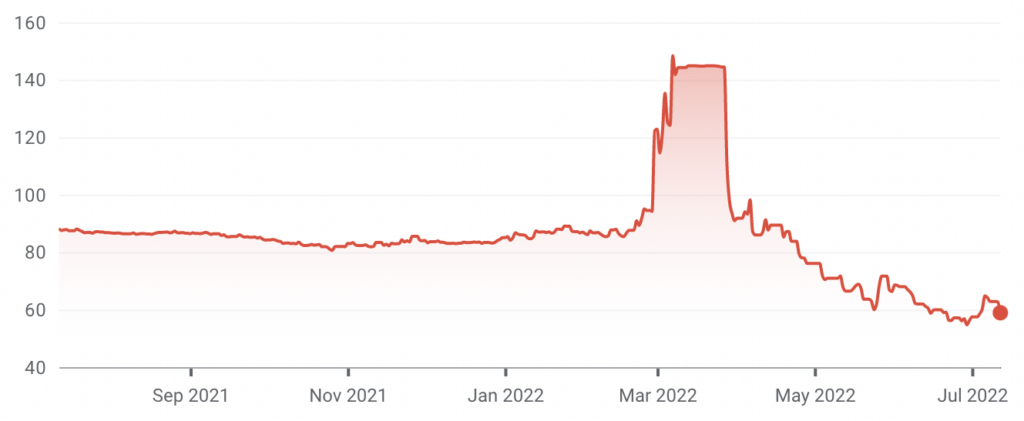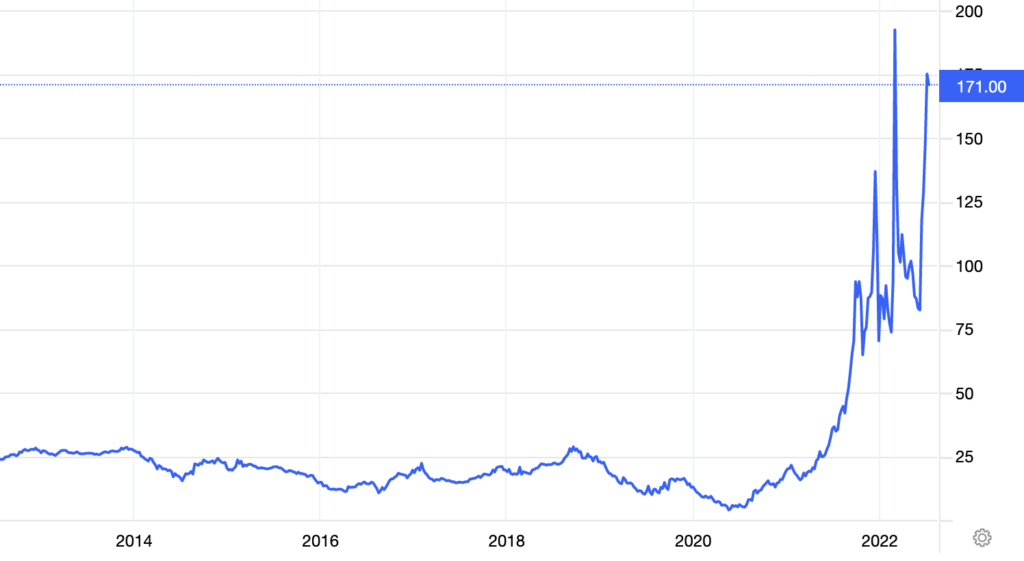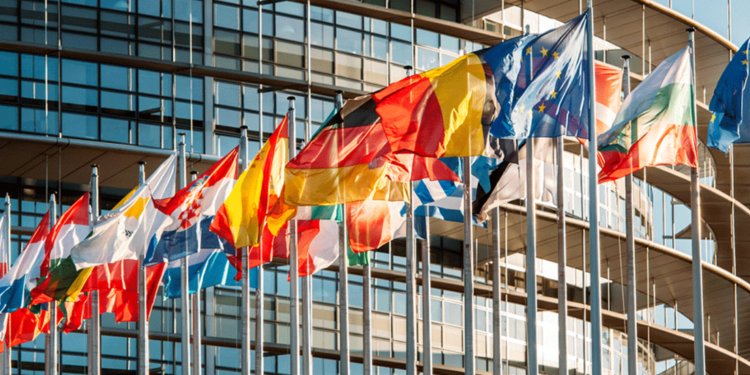The situation in Europe is going from bad to worse.
Inflation is still rising in almost every EU country, with Estonia now logging a rate of 22%. In Russia, meanwhile, inflation fell by 1 percentage point in the month of June. And Russians are used to rising prices; inflation there is the highest since 2015. Inflation in Germany, by contrast, is the highest since the 1970s.
This morning, the Euro reached parity with the dollar, having declined by 12% since the start of the year. But that’s not the only exchange rate shifting against Europe’s interests. As the chart below indicates, the Euro is also way down against the rouble. Before Russia’s invasion, one Euro was worth 85 roubles. It’s now worth less than 60.

And the price of natural gas continues to climb, heaping pressure on consumers and businesses alike. It’s worth putting the recent spike into context to show just how high prices are, relative to what Europeans are used to. The chart below plots the benchmark EU gas price over the last ten years – it’s currently 900% higher than in the mid-2010s.

In case you thought we’d seen the worst of it, there’s more bad news. According to Javier Blas (Bloomberg’s energy man) Europe’s natural gas crisis is “worse than it looks”. He argues that just before the winter “Moscow will completely turn off the tap” – an outcome the market “hasn’t priced yet”. Indeed, the head of the IEA has warned, “This winter in Europe will be very, very difficult.”
As I’ve noted before, energy prices were rising even before the war in Ukraine – thanks to supply chain disruption during the pandemic, and the shuttering of too many oil refineries. Yet sanctions against Russia have undoubtedly exacerbated the problem.
At present, Europe is in the odd position of having sanctioned one major Russian commodity (oil), while it continues to buy large quantities of another (gas). In fact, it’s stranger than that: as EU leaders ramp up sanctions on Russian oil, they denounce Russia for “weaponizing” natural gas. They seem to be saying: ‘It’s unconscionable for us to buy oil from Russia; but it’s also unconscionable for Russia not to sell us gas’.
Needless to say, this doesn’t make any sense. Given the prospect of a major recession if Europe doesn’t put a lid on energy prices, you might ask: why on earth are we persisting with these sanctions? And the answer is: if you look closely, we’re not.
I mentioned previously that Europe is still buying large amounts of Russian oil via India. Basically, India imports crude oil from Russia; refines it; and then sells it on to Europe at a profit. Meanwhile, Europe gets to feel good that we’re not buying directly from Russia, or something.
That’s not all. A recent article in The Times reports that Britain is still importing oil directly from Russia. It’s just that the Russian oil is mixed with Kazakh oil during transit, which allows importers to issue a ‘certificate of origin’ stating that the oil comes from Kazakhstan. This is basically ‘Covid theatre’ for geopolitics.
Likewise, Canada recently confirmed it would return a Russian turbine to Germany that was needed for the Nord Stream 1 pipeline, thereby violating Western sanctions. Russia had previously said it would increase gas supplies to Europe if the turbine was returned – which is what Germany desperately wanted.
Why is Europe flouting its own sanctions? Because it has to.













To join in with the discussion please make a donation to The Daily Sceptic.
Profanity and abuse will be removed and may lead to a permanent ban.
I think all those who can see through the Green scam will be stocking up on food and supplies to see them through the inevitable energy blackouts.
Good to see greenconomics challenged.
It’s green communism masquerading as entrepreneurship. They want us to starve and freeze they are scum. Btw the Tories have actively promoted this, for those still asleep.
We should also remember the CBI have got it wrong on every major economic issue for 50 years or more.
Yes I have used the subsidy analogy many times. Except my shops were shops selling red jeans and green jeans. The red jean shop gets 100% subsidy from the government who prefer us all to wear red jeans. The government and assorted NGO’s who all approve of us all moving to red jeans then make statements in the media eg that “red jeans are now much cheaper than green jeans”. ——-people see this on their TV News and think well when I buy jeans I will make sure they are red.
—-Everything to do with the GREEN agenda is a total eco socialist scam, and government know that most people simply don’t have the time or the inclination to thoroughly investigate the issue of climate and energy, and we probably all have been in a situation where we were in the company of a group of friends or family and the issue of climate came up. If you try to suggest that all might not be as it seems you immediately get people looking at you as if you are from Mars. ——-Such is the power of propaganda.
—-Climate Change is the biggest pseudo scientific scam ever perpetrated, and it is so successful as a scam that it manages to convince a large chunk of the populace that by removing the cheapest most reliable energy that powers 85% of the world that they will be better off. A quite remarkable feat. Imagine going back 100 years and telling people that they must abandon coal oil and gas and that they will be much richer. ——Except people back then would not have been so utterly stupid as we seem to be.
“Except people back then would not have been so utterly stupid as we seem to be.”
Indeed – they were not so ‘educated’.
The problem is more subtle than that, education itself has been stolen and now consists of indoctrination only. The idea that education allows one to think, to apply logic, and form opinion is gone. Have you noticed how the BBC operates? It announces something and then has some supporter interviewed with positive help from Naga or whoever. The subject is never even debated, yet presented as truth and rubber stamped by BBC verify! BBC verify is very corrupt, does no proper research and gets it’s opinions from the Guardian. Please do look at other sources, a little research pays big rewards.
James Delingpole’s ‘Watermelons’ (Green on the outside, red on the inside) was written over a decade ago and is bang on the money. It written factually but wittily. Highly recommended read.
I could probably recommend another 100 books as well as that one. ——“Hubris” (Michael Hart) ——Energy and Climate Wars (Peter Glover and Michal Economides) and Taken by Storm (McKitrick and Essex)————-Happy reading
I agree-Watermelons was a great contribution, and alerted me to the problem.
its a pity James appears to have gone a bit, well…
The Green economy is just a taxpayer-filled trough, and where there’s a trough there will be pigs.
What ‘Green’ products exactly are going to be produced that consumers want we don’t already have?
As far as I can see the Green economy is hydrogen projects, carbon capture, batteries, BEVs, wind and solar installations, insulating homes and buildings.
All of this is reliant on massive taxpayer funded subsidies and increases in consumer prices. It is to serve ideological and bureaucratic interests, not the interests of consumers.
None of this adds to what we have, but replaces what works with what either doesn’t or is less efficient, or nobody wants anyway.
Jobs are a cost, but if the economic activity they undertake produces a value in excess of cost, then we get wealthier. If there is just cost and no benefit, we get poorer. Green economy is all cost.
If these Green products are so good, we would already have them funded by private investors.
You got it.
An interesting thought. What is a green product? Is it a wind turbine? Is it a solar panel? Is it an electric car? Is it a heat pump? Is it even insulation materials? Strangely NONE of these are the slightest bit green, all require massive inputs of fossil fuels and mined minerals. They may over lifetime slightly reduce the CO2 produced, but not by much compared to the CO2 produced in manufacture! The most common insulation in use now is probably foamed polyurethane between aluminium foil sheets. How much oil does this take, and how much electricity to refine aluminum? One might be surprised how high both are. Then there is glass and rock fibre products. Both of these are energy intensive to produce and are made with gas or oil heat. Clearly all these products should be banned at once.
It’s very puzzling. These people are university educated, and suppose to be intelligent. However, net zero and intelligence are a poor fit. So why is it? Puppets on a string?
University educated? There you have it.
“Two things are outstanding in the creation of the English system of canals, and they characterise all the Industrial Revolution. One is that the men who made the revolution were practical men. …they often had little education, and in fact school education as it then was could only dull an inventive mind. The grammar schools legally could only teach the classical subjects for which they had been founded. The universities also (there were only two, at Oxford and Cambridge) took little interest in modern or scientific studies; and they were closed to those who did not conform to the Church of England.”
Jacob Bronowski
And…
“Too much of what is called ’education’ is little more than an expensive isolation from reality.”
Thomas Sowell
“I have never let schooling interfere with my education” —Mark Twain
It is divestment from hydrocarbons, along with blowing up Coal Power Stations and looking virtuous.
Ah, I see what the CBIs problem is. A woman is in charge. Always leads to disaster. Women should not have the vote nor be in charge of anything serious because they mostly vote for welfare and steer organisations toward woke and female centric causes.
Men are grafters (and women perhaps grifters – the comment that got the Reform candidate in so much trouble, but which may be true) and push for success, victory and performance. This is a viewpoint that I will get lambasted for by feminists and femiboys. But our ancestors knew this. That is why women were never in charge of anything involving detail. Queen Elizabeth I ans Queen Anne were advised by men.
Why are these Chief Executives always of a specific type and background, on a merry go round of similar senior posts?